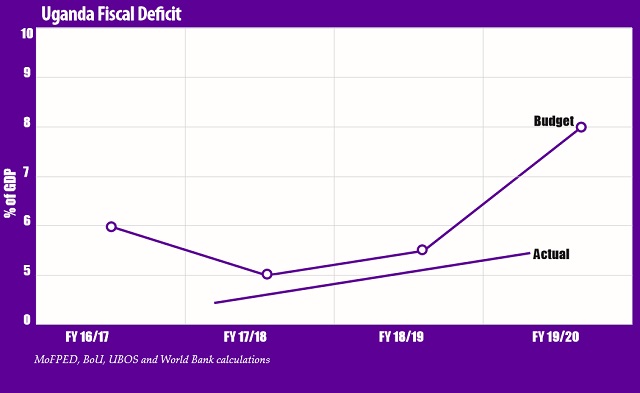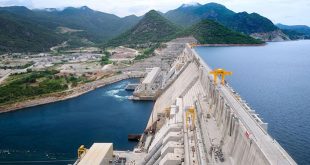
IMF/World Bank views
The Fitch Ratings report appears to build on views contained in the latest IMF report issued in May when its executive board approved US$491.5 million COVID-19 emergency assistance for Uganda under the Rapid Credit Facility.
“The proximity of the early 2021 general elections also brings considerable uncertainty, which could affect sentiment and economic activity and lead to high spending pressures,” the IMF says.
It notes, however, that even before the COVID-19 pandemic, Uganda was already facing challenges in implementing its FY2019/20 budget due to revenue and financing shortfalls and large spending pressures.
Large spending pressures were mounting on the government mostly from wages, security needs, and the preparation for elections.
At the same time, revenue collections had been short of the FY2019/20 budget target by about Shs600 billion (0.4 percent of annualised GDP) in the first half of the fiscal year, due partly to the non-implementation of some of the planned revenue-generating measures and delays in expected oil-sector related revenues.
To cover some of the gap, the government had to issue a supplementary budget and negotiate a commercial loan from the banking sector.
Another lender, the World Bank, in its latest update on Uganda issued in February also noted the risks on the economy posed by the 2021 election. It said that while the growth outlook for Uganda is favourable, risks are tilted to the downside.
“As the 2021 elections draw closer, heightened political activity and uncertainty could lead to a rise in spending, and a fall in investment and economic activity,” the WB update says.
Uganda typically scores badly in the World Bank Governance Indicators (WBGI) which considers factors such as political stability and lack of violence, government effectiveness, rule of law, and control of corruption, voice and accountability, and regulatory quality. Uganda ranks in the 30th percentile. Election time merely increases risk projections and lowers expectations.
In Uganda, election time typically means increased political instability and violence, corruption, and spending by candidates and political parties with adverse effects on the economic fundamentals. The economy was thrown into “total chaos immediately after the 2011 elections” when inflation hit 30%, the highest since 1993.
This time the IMF is warning of civil unrest increasing in Uganda as the population deals with the difficult consequences of the COVID-19 containment measures. The main question is whether the COVID-19 pandemic will produce a temporary shock, from which the global economy and the Ugandan economy would start recovering in the second half of FY2020/21. If the outbreak proves to be more severe, the fiscal costs could be significantly higher, and the recovery could be delayed.
According to the IMF report, Ministry of Finance officials say the economy will perform better than the IMF/World Bank forecasts.
“The Ministry of Finance expects that the economy could recover somewhat faster than projected by staff, with growth at 4.5 percent in FY2020/21, supported by the measures in their response package,” the IMF says.
The Finance officials are banking on exports to neighboring countries to drive the recovery. But the demand for Uganda exports will depend on the economic recovery of its neighbours.
Negative indicators
But Bank of Uganda (BoU) has forecast a likely rise in prices of goods and services in the months towards the general elections.
According to BoU Governor Emmanuel Tumusiime-Mutebile, annual core inflation, which measures the increases in prices of goods and services less electricity, food and water, will peak at 6.4% between October and December 2020. This will be above the 5% inflation target.
There are indications that with six months to the general election, core inflation rose to 4.9% in June from 3.2 per cent in May, according to latest Uganda Bureau of Statistics (UBOS) figures.
While opposition candidates and parties are struggling to fund their campaigns, President Yoweri Museveni routinely employs both state and private resources to run his campaign and that of candidates of the ruling party, NRM.
Museveni and his party pay nomination fees for their candidates, which alone often stretch into billions. According to one study, when nomination fees were increased significantly in 2016, from roughly US$60 (Approx. Shs200,000) to US$880 (Approx.Shs3 million) for parliamentary candidates, the ruling party which had a candidate in every constituency had to pay over US$350,000 in nomination fees alone.
The party also funds the campaign of its candidates while the candidates provide entertainment and physical gifts such as sugar, salt, hoes, motor bikes, and more to voters.
Meanwhile, the government spends more money on election logistics, increased security, and paramilitary forces such as LDUs and crime preventers. The excess spending has led to runaway inflation in all election in Uganda stating in 2006.
Estimates informed by ruling party insiders show that Museveni’s party spent Shs13 billion in the 1996 elections, Shs30 billion in 2001, Shs50 billion in 2006. Estimates for both the 2011 and 2016 elections are much higher, with insiders putting the figures at between Shs.120 billion and Shs.350 billion. The expenditure on the 2021 election is likely to be higher.
 The Independent Uganda: You get the Truth we Pay the Price
The Independent Uganda: You get the Truth we Pay the Price




